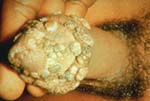Genital Warts

(Human Papilloma Virus-HVP, or condyloma acuminata - venereal wart)
Whatever you call it, this is a nasty sexually transmitted disease (STD), and is a major concern for women if they allow the disease to go untreated. Without treatment the complication that can arise can be cervical cancer.
Now I must stress that genital warts are not the same as 'common warts' that are found typically on hands or feet. You cannot transmit these 'typical warts' to the area of the genitals. Genital warts are a separate disease, however they are highly contagious, and must be treated.
So what are they?
Obviously they are a form of warts. Genital warts are a virus, and depending on the individuals inborn immunity, will affect the outcome of showing symptoms. It is the immunity of that person which may prevent symptoms, more than the amount of exposure that the individual has had with the virus. Many people have been in contact with the virus, but may never show symptoms. However if you are run down or are immuno-suppressed (such as receiving drugs for cancer or have AIDs) you are more susceptible to showing symptoms. But again, anyone can contract them if they have been in sexual contact with someone who has the virus.
Symptoms
They can differ in appearance from person to person. They may not look like you would expect a 'typical wart' would look like. But symptoms can include:
· Small, pink/white fleshy lumps / bumps (around the genital and/or anal area).
· May be singular or in groups.
· If in clusters they can resemble a cauliflower appearance.
Diagnosis
The problem for women with this STD, is that sometimes these warts can go unnoticed, as they may be internal (e.g. on the cervix), therefore there is no way of knowing if they have the disease. However, if a woman knows she has been in contact with someone who has the virus, a Pap smear can often detect the virus. Your doctor may also be able to detect the warts on a visual exam. If you are having casual sex with different people, it is a good idea to have a Pap smear once a year to rule out this virus.
The reason it is important to know whether a female has this virus, is because of the increased risk of cervical cancer that comes with this infection This is because of the changes in cells caused by the wart virus, as they can cause cellular mutation which may result in cancer.
Treatment
Depending on the location of the warts will decide how your doctor will treat them. And sometimes the warts may not respond to one kind of treatment, so your doctor may use another form. If they are located on the outer areas of the genitals the most common form of treatment is liquid nitrogen, which freeze the cells of the warts.
Also used are acids which are applied to the warts, or they can be 'zapped' by an electrical current.
If the warts are located on the cervix, your doctor may decide to use a form of laser treatment, if the infection is quite severe, this may include a mild general anaesthetic to enable appropriate access to the warts.
Sometimes treatment will need to be repeated a few times to eliminate all the warts. Now here's the bad news. If you have had genital warts once, you will have the virus for your entire life. You may never have another attack again, which is usually the case. However, if you become run down, or your immunity is compromised, you may have another episode of warts. Treatment will be the same as you had for the first episode, and hopefully they will not regrow.
If you have had them, it is a good idea to have a yearly examination with your doctor, including a Pap Smear. As once you've had this virus, they may grow back on your cervix (and therefore are difficult to detect) so a Pap smear will help rule out changes in your cells that can potentially become cancerous.
Prevention
This is difficult. Because warts can grow on the base of the penis, and the outer labia, unfortunately condoms are not a guaranteed barrier method against genital warts. Although if the warts are on the area of the penis that a condom will cover, it should protect you. The best way to avoid contracting warts is when you decide to have sex with a new partner, during foreplay try and feel for any bumps, lumps, or anything that seems abnormal. And although many people like the lights dim when having sex, if you can, try and have a look for any abnormalities before you have sex (just try and be subtle about this).
Louise Ganey (RN)
MORE



